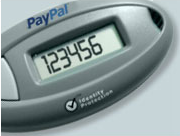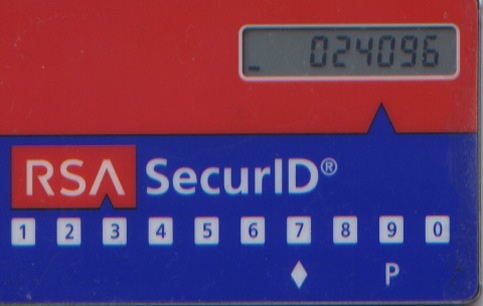I know that fingerprints are not exactly foolproof methods of authentication because they are fairly easy to spoof.
Bottom line, folks: if you want to be safe, you need to rely on more than one factor of authentication.

I know that fingerprints are not exactly foolproof methods of authentication because they are fairly easy to spoof.
Bottom line, folks: if you want to be safe, you need to rely on more than one factor of authentication.

If you do anything more than passively read web pages online, chances are, you've got an identity somewhere. You have an email address (or 10). You have a login on most every site you interact with (e.g. Google, eBay, Facebook). If you use IM tools, surely you've got a name on each of those services.
Even in the offline world, you have lots of identities, depending on whom you're talking with: an identification number, social security number, multiple phone numbers, and the list goes on.
Actually, let's be clear. These aren't identities per-se, they are tokens that uniquely identify you within a specific realm. Let's call them identity tokens for the sake of argument.
Ideally, I'd like to reduce the number of identity tokens I have to manage. I'll save Aswath the trouble of commenting on my post and just say what one solution to that would be: OpenID. It has potential to solve this problem, but it's not deployed widely enough.
But let's make this problem simpler. Let's talk about identity tokens within a single "realm," or multiple realms controlled by the same company, as it were. Best example of that? Jangl.
Jangl provides their "call anyone, anywhere" service through partnerships with a number of different social networks--including Facebook--not to mention their own web portal. Each one of these social networks is a separate realm under which Jangl operates. If Jangl's Facebook application is any indication of how it works in other social networks, Jangl makes it easy to call your buddies/friends within the social network.
Herein lies the rub. What if I am a member of multiple social networks that the Jangl service is using, or what if I want to use, say, Facebook and Jangl's own web portal? The two identities are treated as different. The main problem? I can't associate the same mobile number to both the Facebook and Jangl account. The main reason? The Facebook and Jangl portal "identities" are treated as different when, in fact, they point to the same person--me.
Federating these disparate identities within Jangl should be relatively straightforward, or you'd think anyway. I discussed this issue with their support folks and they have a solution to this problem. Essentially all the "accounts" have one thing in common: your mobile phone number. In theory, you should be able to use the same number across all these accounts provided you can provide the associated PIN.
This doesn't completely work in an ideal fashion, yet. Those of us who are early adopters are likely to have extra problems. As I write this, the Jangl support guys are trying to get my Facebook and Jangl.com accounts linked.
Given all the problems I'm having within the same company, now imagine having to do this between companies or between organizations. You can see it gets ugly fast.
OpenID would certainly be one solution to this problem: allow an account to be associated to an OpenID. Accounts that are associated to the same OpenID--with appropriate authentication, of course--could be linked somehow. Or simply use OpenID as the authorization mechanism and drop the realm-specific authentication schemes altogether.
That being said, there are times--and instances--where I don't necessarily want to be tied back to a single identity. Maybe I'm doing some testing or doing some "stealth" intelligence gathering. OpenID shouldn't be the only option.
What do you think about all this? How can we federate identities while maintaining the ability to have separate ones if you desire? Opinions are welcome.
There's an interesting thread over on Slashdot about parental controls on PCs. Obviously, the crowd on Slashdot is a bit more technical than your average parents. Good thing, as I am in that crowd.
Parental Controls are often seen as a substitute for good parenting. They aren't. Because the kids will eventually find a way to subvert it. That being said, you can do a few things to make it a bit more difficult.
Here's what I do on my family computers, which are all running Windows XP:
Computers In Public Rooms: The kids activities can easily be monitored by good old fashioned parental oversight--the most effective form of parental control.
Limited Accounts: The children use Limited Accounts in XP. This has all kinds of interesting benefits:
Windows Update: It runs in full automatic mode. The computers often get left on so they have a chance to download and install whatever patches Microsoft throws us.
AntiVirus: It's always a good idea to have AntiVirus loaded. I've settled on the free version of Avast.
Web Filtering: At the moment, the web filter is meant to prevent my young children (3 and 7) from accidentally stumbling onto something they shouldn't see. They may bump into it more and more as they get older. The one I'm using? K9 Web Protection from Blue Coat. It's free and relatively noninvasive. If you hit an objectionable site, your browser prevents you from accessing it but gives you the chance to provide the override password.
At some point in the future, I may start monitoring--but not restricting--other network activities. However, that's going to require some planning.
What things do to you do to protect your kids online?

A couple of people I know got signed up for Quechup. My address was apparently "harvested" from the address book of these folks and I've been invited--multiple times, even--to join this service.
I've looked through this service and I see absolutely no reason to join this place. It looks like a lame me-too service with no obvious value. The fact they want an address book is very irritating. Given the relative intelligence on the Internet with regard to these matters, I suspect I will see a lot of spam related to Quechup. Even people who do know better occasionally get sucked in.
Bottom line: avoid these twits like the plague.

As a guy who has made a living in the network security business, and is really unhappy with the state of security on the Internet, I like to see proper security in the hands of real people.
The PayPal Security Key is exactly that. This key adds a second factor to the authentication process for your PayPal account. Instead of just relying on a fixed password to log into your PayPal account, you append a constantly changing passcode to it provided by the PayPal Security Key.
The PayPal Security Key is actually an RSA SecurID token. SecurID tokens are used by corporations everywhere to provide strong authentication to end users. I have to use my SecurID token a couple of times a day to keep my VPN connection to the office alive.
SecurID uses a hardware token with a value that changes every minute or so. The card is synchronized with a server, which validates the authentication attempt. So long as you do not lose this card, your authentication will be secure.
SecurID tokens come in a number of different shapes and sizes. The PayPal Security Key actually fits on your keyring. The one I use for work is about the shape of a credit card. It also contains a keypad on which I enter my own PIN, which hashes the PIN to a different value. The great thing is that the people that maintain the SecurID server don't even need to know my PIN. It just works. ;)
